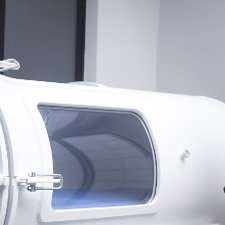- Home
- Editorial
- News
- Practice Guidelines
- Anesthesiology Guidelines
- Cancer Guidelines
- Cardiac Sciences Guidelines
- Critical Care Guidelines
- Dentistry Guidelines
- Dermatology Guidelines
- Diabetes and Endo Guidelines
- Diagnostics Guidelines
- ENT Guidelines
- Featured Practice Guidelines
- Gastroenterology Guidelines
- Geriatrics Guidelines
- Medicine Guidelines
- Nephrology Guidelines
- Neurosciences Guidelines
- Obs and Gynae Guidelines
- Ophthalmology Guidelines
- Orthopaedics Guidelines
- Paediatrics Guidelines
- Psychiatry Guidelines
- Pulmonology Guidelines
- Radiology Guidelines
- Surgery Guidelines
- Urology Guidelines
Hyperbaric oxygen therapy may alleviate symptoms of Alzheimer's Disease

A new Tel Aviv University study reveals that hyperbaric oxygen treatments may ameliorate symptoms experienced by patients with Alzheimer's disease.
"This revolutionary treatment for Alzheimer's disease uses a hyperbaric oxygen chamber, which has been shown in the past to be extremely effective in treating wounds that were slow to heal," says Prof. Uri Ashery of TAU's Sagol School of Neuroscience and the Faculty of Life Sciences, who led the research for the study. "We have now shown for the first time that hyperbaric oxygen therapy can actually improve the pathology of Alzheimer's disease and correct behavioral deficits associated with the disease.
"This research is extremely exciting as it explores a new therapy that holds promise as a treatment for Alzheimer's disease," Prof. Ashery says.
The research was conducted by PhD student Ronit Shapira of TAU's Faculty of Life Sciences; Prof. Beka Solomon and Dan Frenkel of TAU's Sagol School of Neuroscience and Faculty of Life Sciences; and Prof. Shai Efrati of TAU's Sackler Faculty of Medicine, Sagol School of Neuroscience and Assaf-Harofeh Medical Center. It was published in the journal Neurobiology of Aging.
Patients who undergo hyperbaric oxygen therapy for different conditions breathe in pure oxygen in a pressurized room or chamber. In this chamber, the air pressure is increased to twice that of normal air. Under these conditions, oxygen solubility in the blood increases and is transported by blood vessels throughout the body. The added oxygen stimulates the release of growth factors and stem cells, which themselves promote healing.
The TAU scientists used a mouse model of Alzheimer's disease and built a custom-made hyperbaric oxygen chamber suitable for small animals. Then, over the course of 14 days, the team administered hyperbaric oxygen treatment to the mice for one hour per day. After 14 days, the mice underwent a series of behavioral tests as well as tissue biochemical tests to understand how hyperbaric oxygen treatment affects the pathological hallmarks associated with Alzheimer's disease.
The treatment reduced behavioral deficiencies compared to the non-transgenic control mice, reduced plaque pathology by 40%, and reduced neuroinflammation by about 40%.
"There are serious clinical implications to this research," says Shapira, principal investigator of the study. "Hyperbaric oxygen treatment is a well-tolerated and safe therapy used in clinics around the world for various medical conditions, including neurological disorders. Although further research is needed to elucidate the underlying beneficial mechanisms of the therapy and to evaluate its beneficial effects in various Alzheimer patient populations, it holds great potential for the treatment of Alzheimer's disease."
"In this hallmark study, the beneficial physiological effects of hyperbaric oxygen therapy were directly demonstrated on Alzheimer-affected brain tissue," says Prof. Efrati. "We assume that the main challenge in human use will be to initiate the treatment at early stages before the significant amount of brain tissue is lost."
The researchers are currently testing the effectiveness of hyperbaric oxygen treatment on an additional mouse model of Alzheimer's disease to investigate the mechanisms underlying its impact on the disease.
For more details click on the link : Ronit Shapira, Beka Solomon, Shai Efrati, Dan Frenkel, Uri Ashery. Hyperbaric oxygen therapy ameliorates pathophysiology of 3xTg-AD mouse model by attenuating neuroinflammation. Neurobiology of Aging, 2018; 62: 105 DOI: 10.1016/j.neurobiolaging.2017.10.007

Disclaimer: This site is primarily intended for healthcare professionals. Any content/information on this website does not replace the advice of medical and/or health professionals and should not be construed as medical/diagnostic advice/endorsement or prescription. Use of this site is subject to our terms of use, privacy policy, advertisement policy. © 2020 Minerva Medical Treatment Pvt Ltd